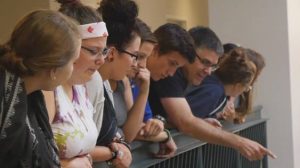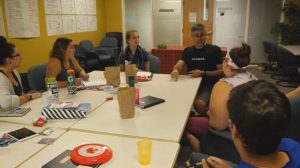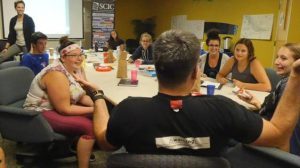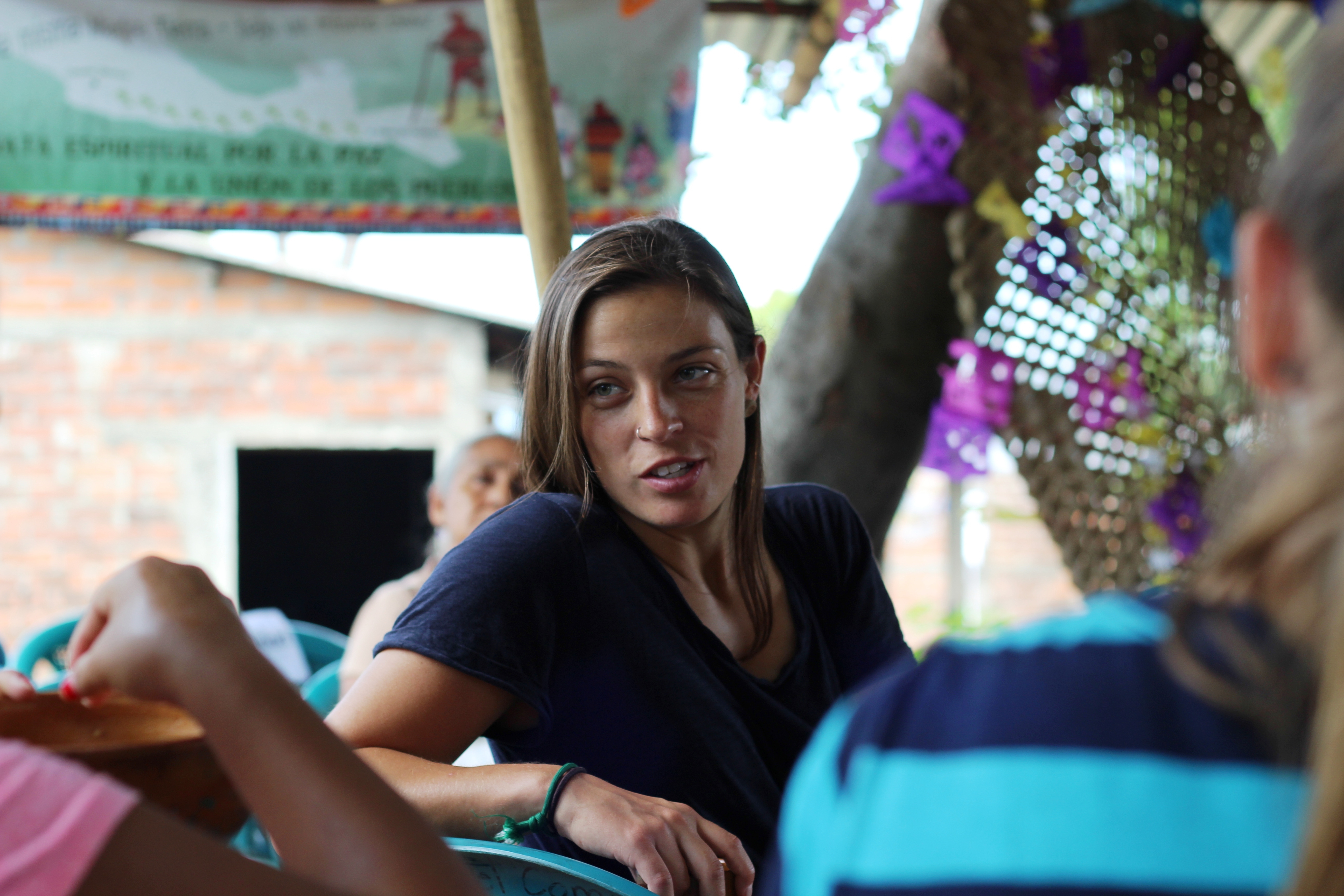
As can be seen by Steffany’s story, the B.Ed. degree offers possibilities for a variety of careers. Assignments engaged in and relationships formed while a student can help shape future directions.
Steffany SalIoum (B.Ed. 2007, Secondary Education–English Major and Social Studies Minor) is currently the Public Engagement Program Officer for the Saskatchewan Council for International Cooperation (SCIC). Last summer, Steffany coordinated a Global Citizen Youth Leadership (GCYL) Program, and involved some of her U of R connections for preparing youth from 8 Saskatchewan schools for their educational experience. Steffany also designed current research that is reviewing Global Citizenship Education in Saskatchewan schools. The following is an interview with Steffany about her experience as a student in the Faculty of Education, and how her education here contributes to the work she is now doing.
What was a highlight for you while a student here?
There was a moment in my 4th year, after my internship, when I understood what it meant to build a learning program from scratch. I realized that it was a highly intentional series of decisions and planning, where all the learning that took place from year to year would build on the previous years to make my holistic learning experience possible. It was clear that the Faculty of Education had hired some exceptional staff and had decided on a strategic direction that would directly influence my passion for activism and for making the world a better place.
In what ways did the Faculty of Education contribute to your personal/professional development?
Throughout the 4-year program it was clear that the Faculty of Education valued instilling the skills associated with becoming a reflective practitioner and life-long learner. If it were not for my Education Professional Studies (EPS) courses and professors I would not have learned the importance of educating for critical consciousness. The skills I learned were fundamental in my personal and professional growth then and now. By critically engaging in my own experience and ways of knowing, I was better able to connect with my teacher identity and personal goals.
Which professors particularly influenced you?
There are several professors in the Faculty of Education who have directly impacted me. Valerie Mulholland taught me how to bring my students and their interests into the creation of individualized learning projects. When I taught the Regina-based TREK School program, I revisited my assignments and memories from my classes with Val. These assignments helped me to understand the importance in having student-led decision-making both as a group and individually as it related to ownership of their work process and work product. As a result, I developed a local and global action research project that would enable students to choose an issue of interest and explore it at the local and global level. We worked one-on-one to collaborate on the essential components of their very individualized projects. Students would use a variety of methods to conduct their research including connecting with community members on their topics. Often the work product of their research resulted in public engagement, documentary creation, school environmental action plans, fair trade school food policies, volunteering, and charitable donations.
Michael Cappello was the first person in my life to have posed very mindful questions that would help me interrogate my power and privilege. Mike clearly explained to me how oppression worked and helped me to consider how I might benefit by it or perpetuate it both in my life and potentially my teaching practice, despite having thought of myself as a “good person.” Mike’s strength and capacity to engage with people is a gift. It is inspiring to watch Mike teach because he breaks down systems of oppression by talking about them from a deeply personal experiential place. He has an energy that is so easy for people to connect with, respect, and admire.
Jennifer Tupper challenged my assumptions and acceptance of multicultural education as a means to meet the mandate of provincial curriculum objectives of embracing diversity in our schools. She encouraged me to imagine my classroom differently whereby diversity was not an add-on event to the school year, but a highly respected element of each and every course and classroom. I understood the importance of ensuring there were both local and global elements to the issues and concepts taught.
Carol Fulton modeled for me the strength in being able to maintain teacher professionalism, in front of her students and peers, while showing emotion and empathy as she deeply connected to people and social justice issues.
James McNinch’s stories and examples of injustice as they relate to LGBTQ rights helped me to confront my heteronormative ideas about the world and provided me with the tools necessary to challenge my thoughts.
In your current position, you are involved in coordinating an intercultural education program for youth: Briefly describe the work you do and how your education at the U of R equipped you for such a role?
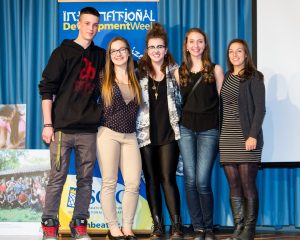
In my position as Public Engagement Program Officer for the Saskatchewan Council for International Cooperation I designed an educational solidarity trip called Global Citizen Youth Leadership (GCYL) Program. The GCYL Program took 8 Saskatchewan high school youth to El Salvador during the 2015 summer to learn about international development. The GCYL program was a unique, short-term, immersive, international experiential learning opportunity for global-minded Saskatchewan youth. Participants explored concepts of solidarity, sustainable development, and equality through three components–pre-tour education, international travel to an SCIC member project, and post-tour debriefing and public engagement work.
During the pre-tour orientation, which laid the foundation of the intercultural education program, we had three facilitators from the U of R Campus:
-
- Dr. Michael Cappello facilitated workshops on anti-oppression, racism, and identity;
- Leo Keiser of the UR Pride Centre facilitated workshops on LGBTQ, gender and sexuality to prepare students for visiting projects supporting HIV/AIDS patients and gender work;
- Lee Prosper with the Aboriginal Students Centre facilitated the “Blanket Exercise” workshop, a resource developed by SCIC member KAIROS to teach about the impacts of colonization and residential schools in Canada.
I would not have been able to develop the GCYL Program without the foundational skills, values, and knowledge that I gained from attending courses provided by the U of R Faculty of Education. Specifically, I learned how to design a course by paying particular attention to ensuring the content and teaching method is inclusive of regional backgrounds and diverse learning needs. Special consideration was made to ensure that the youth were supported through the entirety of their learning experience from pre-orientation readings to the post-trip speaking tour. I understand that some of the best learning takes place when you are completely immersed or place-based, there are hands-on activities, and the structure of the learning is based on building relationships and understandings across cultures and language barriers.
What was the highlight for you in this work?
The highlight for me in doing this work is being able to observe the transformational change in the youth from the beginning of the program to the end. It is rewarding to participate in the learning experience with the youth because I am able to answer or pose questions that help them think more critically and relate their experiences to our context in Saskatchewan. It is my passion to guide people on a questioning path to learn about and understand the world around them.
What experiences in particular developed your passion for anti-oppressive global citizenship education?
As a middle-class woman from Lebanese, Hungarian, and Norwegian descent, I experienced racism and sexism growing up in Regina, Saskatchewan in the mid-1980’s and 1990’s. I experienced a significant amount of shame in my identity that I did not have the knowledge or skills to confront at that time. These experiences in being treated differently than my peers provoked me to ask hard questions that I would not find answers to until university. I have always had a very inquiring mind especially in considering why things are the way that they are, how people think, and how we come to know or understand our place in the world. It is a natural progression to becoming an anti-racist anti-oppressive educator and life-long learner.
You are currently part of a U of R/SCIC research team that is reviewing Global Citizenship Education in Saskatchewan schools? What have you learned through this research? Describe your role in this research?
It is my role to consider ways SCIC can best support educators who teach Global Citizenship Education in the province. In order to assess this, I needed to learn more about the current understandings of GCE and where there are gaps in knowledge and resources.
I designed the research study A Review of Global Citizenship Education in Saskatchewan Schools.
The SCIC, with funding from the University of Regina’s Community Research Unit, has completed Phase 1 of a research study entitled A Review of Global Citizenship Education in Saskatchewan Schools. The intent of this study was to find the current situation of Global Citizenship Education (GCE) in Saskatchewan schools and compare it to a 1988 study of Global Education done by SCIC.
Preliminary results of Phase 1 suggest that Saskatchewan educators, while teaching many of the concepts of GCE, do not use the term. Likewise, provincial curriculum emphasizes the goals of GCE, without terming it as such. While Global Education continues to be the predominant term that educators and the Ministry of Education use in areas related to GCE, the goals of GCE are being taught by individual teachers who are interested in the topics. However, more needs to be done to support Saskatchewan educators with GCE resources, training, and formal education.
The 1988 SCIC study showed a variety of teachers’ responses about global citizenship education and what they needed to teach it in the provincial schools. The main responses were: more quality resources, specialized workshops, university training, and a speakers’ bureau. In 2015, those same needs have not changed substantially. SCIC will continue to build on the preliminary results found to date in Phase 2 of this study.
See Phase 1 findings here: http://earthbeat.sk.ca/for-educators-and-youth/research-on-global-citizenship-education/
What are your future educational/professional goals?
I have recently been accepted to complete a Master’s of Education in Curriculum and Instruction at the University of Regina. It is my desire to continue creating and participating in anti-racist anti-oppressive teacher or student-centered educational opportunities in Saskatchewan. I aspire to be a leader in innovative and anti-oppressive undergraduate and graduate research, scholarship, teaching, learning and service.
What is your vision for Anti-Racist, Anti-Oppressive Global Citizenship education in Saskatchewan?
I imagine that Saskatchewan’s educational institutions champion approaches to teaching and learning that are based on anti-racist, anti-oppressive global citizenship education. The following excerpt is taken from a publication from the education sector at UNESCO and it resonates with how I understand the future of global citizenship education in Saskatchewan. The publication is called Global Citizenship Education: Preparing Learners for the Challenges of the Twenty-first Century.
“In an increasingly interconnected and interdependent world, there is a need for transformative pedagogy that enables learners to resolve persistent challenges related to sustainable development and peace that concern all humanity. These include conflict, poverty, climate change, energy security, unequal population distribution, and all forms of inequality and injustice which highlight the need for cooperation and collaboration among countries which goes beyond their land, air, and water boundaries. In a globalized world, education is putting more emphasis on equipping individuals from an early age, and throughout life, with the knowledge, skills, attitudes and behaviours they need to be informed, engaged and empathetic citizens. And with increasing interconnectedness, for example through information and communication technologies (ICTs) and social media, the opportunities for collaboration, cooperation, shared learning and collective responses are increasing.”
I believe that it is a responsibility of educators to understand, identify, and address individual and systematic forms of oppression based on race, gender, sexuality, socio-economic status, religion, age, disability, and other socially constructed categories.
Through SCIC, I hope to create opportunities to introduce educators to select theories, and practical resources and tools that will widen their understanding of the global citizenship education and international development issues, while at the same time enable teachers to critically and productively interact with both their immediate and global educational and social development environments.
What advice do you have for new graduates of the B.Ed. program?
My advice for new graduates from B.Ed. programs is to learn and apply a student-centered, constructivist approach to teaching and embrace pedagogy of discomfort in your life and your teaching practice by seeking answers to challenging questions. It can be very rewarding to challenge yourself to work in settings that make you uncomfortable, to learn from and cope with what you learn about yourself and to discover who you want to be as an educator.
Photos of Dr. Michael Cappello working with students.
“I was thrilled to help out. It’s exciting any time you get a chance to work with youth. They were enthusiastic and willing to learn; in fact, I was surprised at their eagerness for the kind of education we were offering.” ~Dr. Michael Cappello
